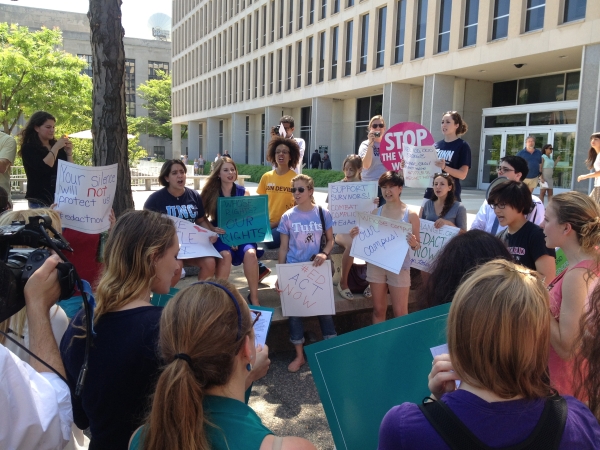You have /5 articles left.
Sign up for a free account or log in.
WASHINGTON – Annie Clark, a recent college graduate whose activism has helped spur an unprecedented movement to expose sexual assault on college campuses, got a pretty unforgettable present for her birthday this year.
There were only a few dozen students rallying alongside Clark outside the U.S. Education Department here on Monday, but their shouts – which, for the first time in a long time, felt celebratory – were loud enough to lure Under Secretary Martha Kanter from the department’s concrete fortress.
“I’ll deliver these to Secretary [Arne] Duncan right away,” Kanter said as she accepted box after box of signatures -- 115,471 upon delivery (and nearly 123,000 by Monday night) – on a petition calling on Duncan, the department and its Office for Civil Rights to better enforce federal laws to protect students from sexual assault. Kanter, who appeared only briefly, didn't comment on the specifics of the protests, and OCR did not respond to a request for comment Monday night.
Kanter’s appearance was unexpected, and the students who’d come here from across the country were thrilled that she acknowledged their hourlong protest in sweltering heat. While Duncan, the main target of the event, did not appear publicly, student organizers met with him afterward in an off-the-record meeting.
“We call on you to stand with us, finally,” one activist, Alexandra Brodsky, shouted at Duncan through the megaphone. “We need you to stand with us.”
Brodsky, who helped write the petition, is a former Yale University student who alleged in a federal complaint that the institution violated Title IX of the Education Amendments of 1972 by failing to eliminate a hostile campus environment of sexual discrimination.
On Monday, Brodsky criticized OCR for taking a year to resolve the complaint, and then settling for a resolution agreement. The norm for Title IX investigations, these settlements require institutions to make various policy and procedural changes, but really amount to no more than “a slap on the wrist,” students asserted. Despite OCR's finding that Yale failed to eliminate that hostile environment and underreported dozens of instances of sexual assault, a settlement means the university was not out of compliance with Title IX.
“PR disaster averted; not enough has changed at Yale,” Brodsky said. “We’re left with little more than empty promises.”
OCR often warns campuses that violating Title IX could result in a loss of federal funding -- and reminded all colleges in a high-profile and controversial April 2011 "Dear Colleague" letter that they have myriad obligations under Title IX -- but the department has never taken that step.
However, most experts agree that this OCR administration is taking a harder line than in the past on sexual assault, and some groups -- including the American Association of University Professors and the Foundation for Individual Rights in Education -- have accused the department of overstepping its bounds.
Brodsky was joined Monday by sexual assault survivors and activists who, by boots-to-the-ground research and networking, have been instrumental in bringing forth a new wave of Title IX complaints. Just last week, the Education Department announced it would investigate a pending complaint at Swarthmore College.
“They seem to really be taking it seriously,” said Clark, a former University of North Carolina at Chapel Hill student who helped file a complaint there and is now involved with Know Your IX, a website and network for students looking for information on the federal law and what it requires of campuses. Monday’s event was the first time many of these students -- who have talked, studied and grieved together countless times over the phone and social media -- met in person, Clark said in an interview. “I feel it’s very fitting that it’s on my birthday.”
The petition’s specific demands include that OCR: levy sanctions against colleges that fail to comply with federal law, including Title IX and the Clery Act (which mandates campus crime reporting); proactively investigate colleges rather than relying on official student complaints; complete investigations in a “concretely delineated and timely manner;" and involve complainants when deciding on resolution agreements.
OCR noted last year that the office is receiving and resolving more discrimination cases than ever before, and doing so faster.
Carolyn Luby came down from the University of Connecticut because most of the cases gaining national attention -- at Occidental, Amherst, Dartmouth and Swarthmore Colleges, as well as UNC, Yale and the University of Southern California – are at private or elite institutions.
“It affects so many more schools than that,” said Luby, who wrote an open letter to Connecticut President Susan Herbst in April arguing that the administration was complacent with sexual violence by athletes. (The letter gained national media attention, much of it mocking. Herbst responded with this statement, and another from the university a few days later said officials disagreed with some of the accusations but expressed support for students who are attacked or harassed.) Luby said, “I think it’s so important to be here, be visible. This is not just a prestigious or elite college issue."
It’s the “lackadaisical response” from the Education Department that allows colleges to place “the PR factor” over student safety, said Charles Clymer, a survivor of child abuse whose experience at the U.S. Military Academy galvanized him to speak out about sexual violence. Clymer, who spent six years in the Army before enrolling at Georgetown University, blogs on these issues and runs a Facebook page called Equality for Women.
“The department just needs to enforce the law…. When the Department of Education does nothing, it gives campuses an excuse to not do anything,” Clymer said in an interview. “If you have all these activists here at the same time, people are going to take notice.”
Aided by frequent and impassioned chants of “Whose campus? Our campus! Whose rights? Our rights!” and “two, four, six, eight, no more violence, no more hate! Three, five, seven, nine, schools need to follow Title IX!,” students told their stories.
Wagatwe Wanjuki is a former student who said OCR's response to her 2009 Title IX complaint against her campus left her confused and with little information about the office's process or findings.
“I knew that the law as it’s being enforced was not on my side. I had no hope,” Wanjuki said.
Stories like Wanjuki’s are not lost on people like Jasmine Lester, a recent graduate whose campus complaint was dismissed, she said. Lester is considering a federal complaint against her alma mater, but fears retaliation (her parents both work on the campus, and recent graduates need references), and isn’t persuaded that it would help.
But Lester is trying to get other victims to step forward and file a complaint. “I hope that if people see me talking about it, they’ll be more open to talking about it."








